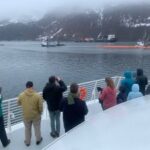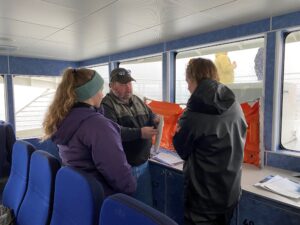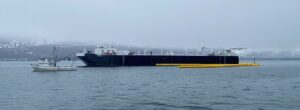
The Council held a tour for locals to observe the annual oil spill response training for fishing vessels in Valdez, Alaska, on May 3, 2023. This has been an annual event since 2016, rotating through several communities in the region, though it was postponed during the height of the COVID pandemic. The Valdez community was invited to join the Council from 12:30 to 3 p.m., on a Stan Stephens Cruises vessel to observe the training.
Valdez High School student Izzy Kizer stated about the event, “We need to know how to prevent [oil spills], but when they do happen, it’s very important to know how to clean them up. Some of these things, they work on a way larger scale than we’re aware of and seeing that helps broaden your perspective.”
The local fishermen participating in the training are contracted by the Ship Escort Response Vessel System, also known as SERVS, to respond in the event of an oil spill from a Prince William Sound tanker or the Valdez Marine Terminal. SERVS is Alyeska Pipeline Service Company’s oil spill removal organization and coordinates annual spill response exercises in multiple Southcentral Alaska communities, including Valdez.
This Council event helps keep communities informed on what oil spill prevention and response measures are in place in Prince William Sound and downstream communities, especially those involving their local fishermen. Valdez residents learned about oil spill response technology, tactics and how this program helps Alyeska operate safely in Prince William Sound. Narrators from both the Council and Alyeska were on board to describe the activities so that participants could better understand the training. We would like to thank our partners, Alyeska/SERVS and Stan Stephens Glacier & Wildlife Cruises, for helping to support this event.

”It takes a lot of coordination and cooperation from so many different entities in the community and that’s really fun for the students to see,” said Gilson Middle School teacher Ann Norris. This sentiment was echoed by Mo Radotich, one of several representatives from the Alaska Department of Environmental Conservation on board the tour. “I think it’s good for us all to get together – from regulatory, industry, RCAC, community members that are here. I think it’s important to see us working together and keep developing those relationships,” said Radotich.
Alyeska’s contracted fishing fleet is the backbone of their oil spill response system. It is essential to the system operating as it was designed to do and part of what makes the Prince William Sound system world-class. These contracted vessels and their crews help ensure the most comprehensive response measures are in place for both open water and nearshore resources. A major lesson of the Exxon Valdez spill was that incorporating local mariners into the spill response system helps ensure a quick, efficient and effective response.

Since the inception of SERVS after the Exxon Valdez oil spill, the Council has been highly supportive of local fishermen and mariners being trained annually with the best available technology to prepare for oil spills. Valdez mariners have the most intimate knowledge of, and connection to, the waters in and around Valdez. Their involvement would help protect the most sensitive areas, such as hatcheries and spawning streams, from spilled oil.
“It’s such an integral part of our community. We’re so dedicated to the fishing industry, so protecting that resource is paramount,” said Valdez resident Shannon Day. “It’s important for us as adults to know about this, for the children to be exposed to it, so that they have the same love and dedication as they grow up.”
The Council has held previous fishing vessel oil spill response training tours in Seward, Whittier, Cordova and Homer. The Council hopes that through such programs communities will understand the importance of oil spill prevention and having the most robust response strategies in place in the event of a spill.
“You know what, I’ve lived in Valdez for 21 years, and spent a lot of time in the Sound. Today I learned a lot of stuff about oil spill response and different functions of Alyeska,” said Gilson Middle School principal Rod Morrison. “If we don’t learn about it, there’s a danger that it could happen again. The [Exxon Valdez] oil spill was terrible and some of the precautions we have in place now will help prevent that from happening again, but we also have a great system if it does happen again.”